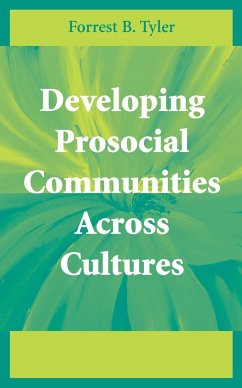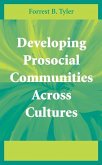Communities are basic vital social units that provide the contexts in which people learn to live together to their mutual benefit. They are crucial to providing a richer and more fulfilling framework than we currently have for understanding and improving the quality of life for individuals and groups alike. The author defines what exactly prosocial communities are, identifying its elements and relevant interrelationships, and providing the available evidence in support of those conclusions. This work shows why a prosocial community is essential to the accomplishment of the goals of community psychology and its related fields, as well as how to create such communities.
Hinweis: Dieser Artikel kann nur an eine deutsche Lieferadresse ausgeliefert werden.
Hinweis: Dieser Artikel kann nur an eine deutsche Lieferadresse ausgeliefert werden.
From the reviews:
"Developing Prosocial Communities Across Cultures dares to take a step toward the daunting task of repairing communities broken down by 'antisocial' ... attitudes and behaviors. ... the beauty of this work is in its groundbreaking consideration of the complexities of individuals and their behaviors, integrated within social, economic, and political systems. ... This is an important work for students of social capital, social psychology, and community-based organizations seeking the benefits but difficulties of collective change in the form of risk reduction or community problem solving." (Tanya Telfair Sharpe, PsycCRITIQUES, Vol. 53 (17), April, 2008)
"Developing Prosocial Communities Across Cultures dares to take a step toward the daunting task of repairing communities broken down by 'antisocial' ... attitudes and behaviors. ... the beauty of this work is in its groundbreaking consideration of the complexities of individuals and their behaviors, integrated within social, economic, and political systems. ... This is an important work for students of social capital, social psychology, and community-based organizations seeking the benefits but difficulties of collective change in the form of risk reduction or community problem solving." (Tanya Telfair Sharpe, PsycCRITIQUES, Vol. 53 (17), April, 2008)
"Dr. Tyler's book fills the void between theory and policy/action, a much needed treatise. It also provides the guidelines for taking the steps to make psychology more socially responsible and accountable to society. Tyler uses a multicultural, multiethnic approach to problems, and stresses the importance of an 'involved' stance in working cooperatively with the members of the community, indeed nourishing and empowering individuals and communities to take on the responsibility to solve their problems and to be in charge. Three levels of action are delineated: social action, social planning, and locality development "that need to function in concert ... to construct and sustain prosocial communities." The book is rich with many good examples from diverse settings, which are discussed at length to provide the reader with a better understanding of the basic conceptual and practical issues at hand. The best description of this work is given by the author, himself, 'People's problems are basically humanitarian, not psychological (what is done here) is basing our psychological understandings on that humanitarian perspective.' It is an exemplar of good community psychology with the right interweaving of theory and action toward contributing to human and community well-being. The construct of Prosocial Communities aptly describes this goal which, as this book shows, can be a reality rather than a utopia. This is a must read for all psychologists, policy planners, social workers and other social scientists and professionals who are genuinely interested in creating social change toward prosocial communities."-Cigdem Kagitcibasi, Ph.D., Koc University, Istanbul, Turkey








